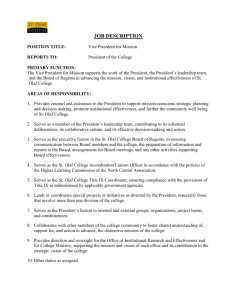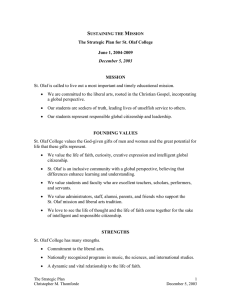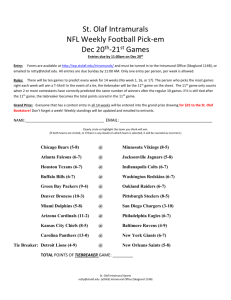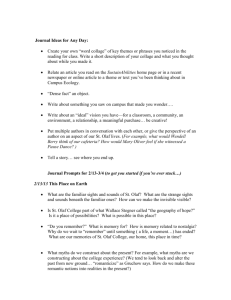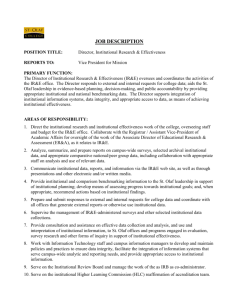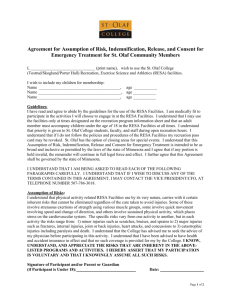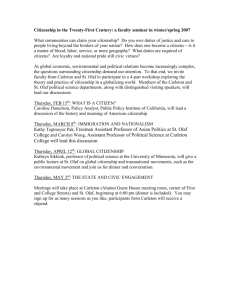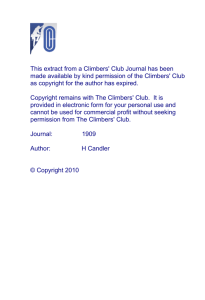CHECK LIST FOR PROPOSING AN INDIVIDUAL MAJOR
advertisement
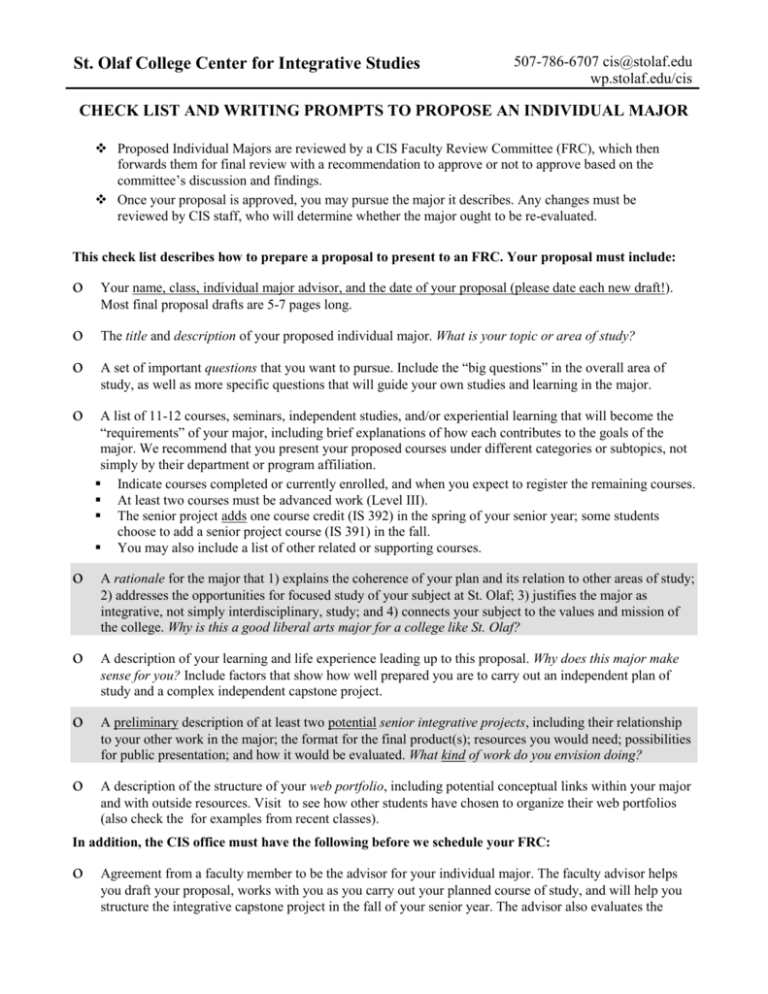
St. Olaf College Center for Integrative Studies 507-786-6707 cis@stolaf.edu wp.stolaf.edu/cis CHECK LIST AND WRITING PROMPTS TO PROPOSE AN INDIVIDUAL MAJOR Proposed Individual Majors are reviewed by a CIS Faculty Review Committee (FRC), which then forwards them for final review with a recommendation to approve or not to approve based on the committee’s discussion and findings. Once your proposal is approved, you may pursue the major it describes. Any changes must be reviewed by CIS staff, who will determine whether the major ought to be re-evaluated. This check list describes how to prepare a proposal to present to an FRC. Your proposal must include: Your name, class, individual major advisor, and the date of your proposal (please date each new draft!). Most final proposal drafts are 5-7 pages long. The title and description of your proposed individual major. What is your topic or area of study? A set of important questions that you want to pursue. Include the “big questions” in the overall area of study, as well as more specific questions that will guide your own studies and learning in the major. A list of 11-12 courses, seminars, independent studies, and/or experiential learning that will become the “requirements” of your major, including brief explanations of how each contributes to the goals of the major. We recommend that you present your proposed courses under different categories or subtopics, not simply by their department or program affiliation. Indicate courses completed or currently enrolled, and when you expect to register the remaining courses. At least two courses must be advanced work (Level III). The senior project adds one course credit (IS 392) in the spring of your senior year; some students choose to add a senior project course (IS 391) in the fall. You may also include a list of other related or supporting courses. A rationale for the major that 1) explains the coherence of your plan and its relation to other areas of study; 2) addresses the opportunities for focused study of your subject at St. Olaf; 3) justifies the major as integrative, not simply interdisciplinary, study; and 4) connects your subject to the values and mission of the college. Why is this a good liberal arts major for a college like St. Olaf? A description of your learning and life experience leading up to this proposal. Why does this major make sense for you? Include factors that show how well prepared you are to carry out an independent plan of study and a complex independent capstone project. A preliminary description of at least two potential senior integrative projects, including their relationship to your other work in the major; the format for the final product(s); resources you would need; possibilities for public presentation; and how it would be evaluated. What kind of work do you envision doing? A description of the structure of your web portfolio, including potential conceptual links within your major and with outside resources. Visit to see how other students have chosen to organize their web portfolios (also check the for examples from recent classes). In addition, the CIS office must have the following before we schedule your FRC: Agreement from a faculty member to be the advisor for your individual major. The faculty advisor helps you draft your proposal, works with you as you carry out your planned course of study, and will help you structure the integrative capstone project in the fall of your senior year. The advisor also evaluates the completed senior project in the spring. Faculty advisors write a recommendation after the Faculty Review meeting that will be added to your proposal packet for the approval committee. Your summary of your consultation with your assigned reference librarian about research strategies in the field(s) of the major, as well as potentially useful search terms and specific resources for the major and the senior project. What does research in your field look like? What data-gathering methodologies will be most useful? A four-year course grid or similar plan showing your schedule for completing your major and other graduation requirements. A course grid form is available at or from the CIS office, or you can write up your own plan on a separate (single) page. Aids for composing the description of your individual major: The description presents the central subject matter of your major in a clearly written paragraph. It answers the question, What is this major about? 1. Include the broad topic or subject area of your proposed major (“What I plan to study is...”) 2. Include a description of subtopics, special areas of interest, and any particular skills or methods you will need to develop (“In order to understand my subject, I will need to learn about…, and I will need to develop these skills…” “I’m particularly interested in…”) 3. List some of the main questions that inspire and will guide your studies (“As I think about my topic these questions will drive my studies…”) 4. List departmental (and other) resources you plan to use as you pursue your proposed major. Aids for composing the rationale for your individual major. The rationale is an explanation of the validity and coherence of your proposed major, and a justification for pursuing your major at St. Olaf College. It answers the question, Why is it appropriate to carry out this major at St. Olaf? Here are some things you might address in a rationale. 1. Explain why your subject matter is important. 2. Show that your subject doesn’t duplicate or “tweak” an established major. 3. Show that your major progresses from basic material to more sophisticated approaches – that is, that you are not just sampling introductory courses in many areas but finding ways to explore your topic in depth. 4. Show that your plan makes good use of available resources at the college. 5. Justify the combination of areas in your major. (Explain how the courses and subtopics fit together and how learning in one area of the major connects with or reinforces learning in other areas.) 6. Justify the inclusion of your major in the curriculum of a liberal arts college. (Explain how your subject relates to concerns of the liberal arts, for example, perennial questions about values, truth, or beauty; appreciation for historical contexts or circumstances; critical interpretation and analysis of phenomena.) 7. Give reasons for including your major specifically at St. Olaf College. (Explain how your subject relates to the distinct interests of St. Olaf, like those included in the college’s public statements about itself. Examples: Does your major help develop a “global perspective”? Will it prepare you for a life “of worth and service”? Does your major connect you to the traditional interests of the liberal arts? Is your major consistent with the values of a college that is “rooted in the gospel”?) 2-Mar-16 rev
